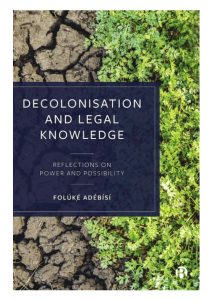Tby Foluke Adebisi, University of Bristol Law School
Since 2015 and the #RhodesMustFall movement in Cape Town, South Africa, as well as its counterpart student movement at Oxford University in the UK, the question of the relevance of decolonisation to higher education has become quite prominent across Global North universities. Before this upsurge of interest, my academic work had been majorly concerned with the effects of incomplete decolonisation of African polities, for example, continued education dependency and humanitarian interventionism. However, with the increased focus on decolonisation in UK higher education, I became extremely frustrated with what I saw as the inadequacy, misunderstandings, and misuses of decolonisation as a practice and logic. I feel that these arose, not only from adamant refusal to engage with the questions thrown up by decolonisation, but also from the lack of a conceptual foundation to engage with those same questions.


